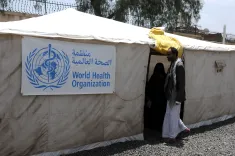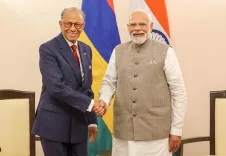What Happened in the Meeting Between South Korea's Industry Minister and the US Commerce Secretary?

Synopsis
Key Takeaways
- Korea's investment of US$350 billion in the U.S. is a significant move.
- The current tariff rates are 25 percent and aim to be reduced to 15 percent.
- Discussions are ongoing, but an impasse exists regarding investment details.
- The recent U.S. immigration raid has caused tensions.
- National interest remains a top priority for South Korea.
Seoul, Sep 13 (NationPress) The South Korean Industry Minister Kim Jung-kwan and US Commerce Secretary Howard Lutnick convened in New York for discussions regarding the trade agreement established in July, as reported by various sources.
This week, Kim has traveled to the United States to resolve discrepancies concerning the specifics of the trade pact, which entails South Korea investing US$350 billion in the U.S. in exchange for the reduction of reciprocal tariffs on South Korea from 25 percent to 15 percent.
As per diplomatic sources, the talks took place at a confidential location in New York, as per reports from the Yonhap news agency.
One source commented on the discussions, stating, "I don't believe we are at a stage to announce an outcome."
The trade agreement was established in July and was broadly reaffirmed during last month’s summit in Washington between President Lee Jae Myung and U.S. President Donald Trump.
However, the specifics of the investment plan are still unresolved, with South Korea's presidential chief of staff for policy, Kim Yong-bum, recently indicating that both parties are at an "impasse."
Lutnick mentioned in a CNBC interview that South Korea must either accept the bilateral framework trade agreement from July or face 25 percent tariffs.
The following day, South Korea's presidential office emphasized that national interest would be the foremost priority.
As President Lee Jae Myung stated, "we will not engage in negotiations that stray from rationality and fairness," remarked a presidential official.
Moreover, the recent U.S. immigration raid that led to the detention of hundreds of South Korean workers in Georgia has not only embarrassed a close ally of the United States but could also leave a "deep scar" on the economic relations between the two nations, raising concerns over foreign investment in the U.S., according to industry analysts.
Approximately 475 workers, including around 300 South Koreans, were arrested last week during a raid at a Georgia construction site for an electric vehicle (EV) battery facility being developed by a joint venture of Hyundai Motor Group and LG Energy Solution, citing alleged unlawful employment practices.
The South Korean workers were flown back home via a chartered Korean Air flight from Atlanta.








